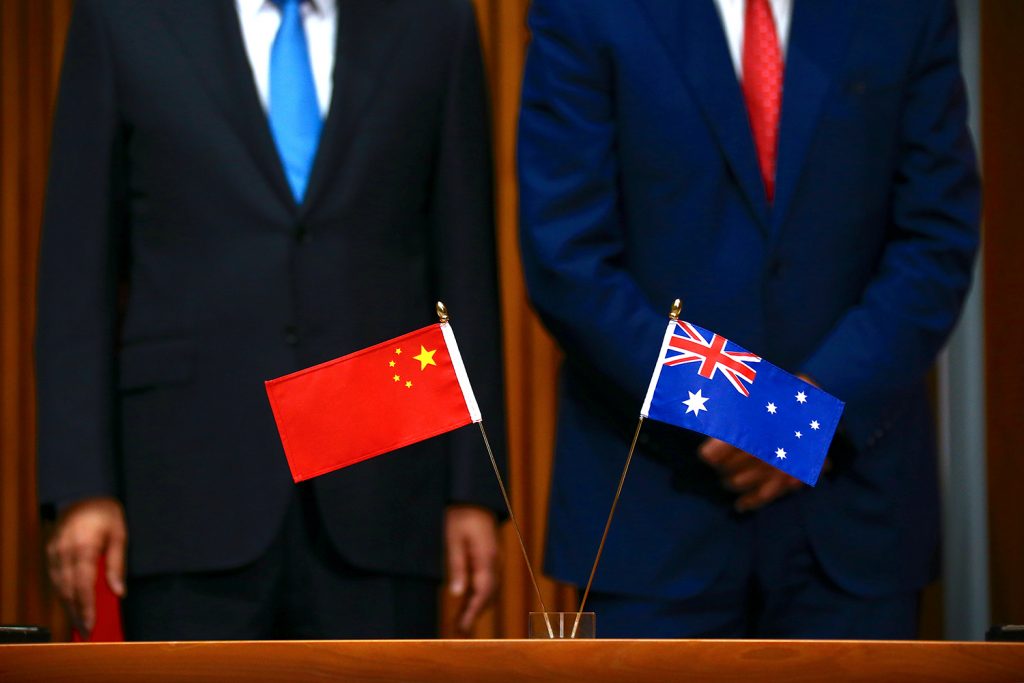
Australia's Prime Minister Malcolm Turnbull (R) stands with Chinese Premier Li Keqiang during an official signing ceremony at Parliament House in Canberra, Australia, March 24, 2017. REUTERS/David Gray
The challenges of foreign
influence have drawn significant attention in recent years. While many have
rightly focused on ‘meddling’
in democratic
elections
around
the world and the
hacking of governments
themselves, there are more subtle, and arguably more insidious, forms of
foreign influence taking place that need greater attention. Much of this
influence comes from pressure applied via economic leverage, whether it be on
pop culture, sport, or increasingly within academia.
While incidents of this latter
pressure are occurring across the West, Australia and New Zealand have found
themselves at ground zero for this contest, due to their proximity to China and
their desirability as a destination
for foreign students.
Australian universities have long
been a destination for students from around the world and it has become a huge
part of the Australian economy: education
is now Australia’s third biggest export. Chinese students represent by far
the largest proportion of that population making up around a third of the total
international student body, which itself accounts
for around a quarter of enrolled students at Australian universities.
To be clear, having a significant
international student body at any university is an unalloyed good. They inject
new perspectives and thinking, broaden the range of research, build strong
inter-cultural personal networks, and inject funding into centers of learning.
It is also a great path for attracting foreign talent into a domestic economy.
However, as China’s regional
ambitions grow and its attempts to influence regional policies becomes more
aggressive, universities are becoming a contested space. There are increasing
concerns that Australian universities are becoming over-reliant
on the funding associated with Chinese students studying there, and actively limiting
activities on campus because they may upset both the Chinese students and
authorities.
While it has not yet occurred,
there is the risk that China could use the threat of limiting the number of
students attending Australian universities as an economic lever. They have
repeatedly demonstrated a willingness to use domestic consumer demand and tourist
spending as a way to punish or shape countries Beijing has policy
disagreements with, and there is no reason to think they wouldn’t do the same
with students.
Most worrying is the increasing
direct investment within the Universities themselves, such as the spread of Confucius Institutes. While billed as
cultural outreach and language centers that promote positive aspects of Chinese
culture, the Chinese government provides funding of $100,000 a year as well as
teachers and materials to the institutes.
The host universities often sign
agreements “explicitly
stating they must comply with Beijing’s decision-making over teaching at the
facilities.” While it is claimed the centers don’t engage in political
discussion, they have been described by Chinese officials as an important part
of “China’s overseas propaganda
setup,” and are used to influence
opinions across the university.
There are also concerns that collaborative
research programs undertaken by universities with Chinese academics on sensitive
technological topics, such as artificial intelligence and quantum physics, link
directly back to the Chinese military.
Then there are the examples of
student bodies being leveraged to generate
‘patriotic’ crowds in foreign nations to either protest or support Chinese
objectives, and a spate of tense clashes on campuses at both Australian and New Zealand campuses
related to pro- and anti-China issues.
China’s effort to censor and
undermine Western academics have also been more direct. Several academic
journals have been pressured to modify or remove
articles that the Chinese government disagrees with. China is also suspected
of being behind a sophisticated
and extensive cyber-attack on the Australian National University last year.
The risks are significant. Some
national security agencies within Australia are wary of any collaboration with
Australian universities due to the risk of compromise, and there are reports
that perceived dissent by Chinese students on Australian campuses has resulted
in harassment
of their families on the mainland.
But the risks are being taken
seriously. Australian officials are proud of the broader efforts to curb
foreign influence, such as enacting legislation targeted to mitigate those
efforts and the banning of Chinese telecom giant Huawei from 5G networks. In
order to respond to the specific risks to universities, they have now published
voluntary guidelines
on to take practical steps they can take to mitigate potential sources of
foreign meddling.
These efforts are a good step forward, but universities are not yet equipped with the tools needed to tackle their new role within the contest for influence. That will need to change, as risk of foreign interference will only grow in the future.
John Watts is a nonresident senior fellow in the Atlantic Council’s Scowcroft Center for Strategy and Security. Follow him on Twitter @John_T_Watts.
Further reading:
Wed, Oct 23, 2019
While censorship and propaganda have long been features of Chinese domestic politics, Beijing is ramping up its information operations abroad.
New Atlanticist
by
David A. Wemer
Mon, Oct 7, 2019
Rapid advances in digital technologies amplify the potential for data acquisition from and influence over other states. One state aggressively pursuing digital advantage globally is China, especially in its leveraging of artificial intelligence (AI).
Infographic
by
Thomas A. Campbell
Fri, Apr 19, 2019
The joint exercises and constant contact give soldiers from both countries opportunities to practice working together, as well as building those personal ties.
New Atlanticist
by
David A. Wemer
As China’s regional ambitions grow and its attempts to influence regional policies becomes more aggressive, universities are becoming a contested space. There are increasing concerns that Australian universities are becoming over-reliant on the funding associated with Chinese students studying there, and actively limiting activities on campus because they may upset both the Chinese students and authorities.
|